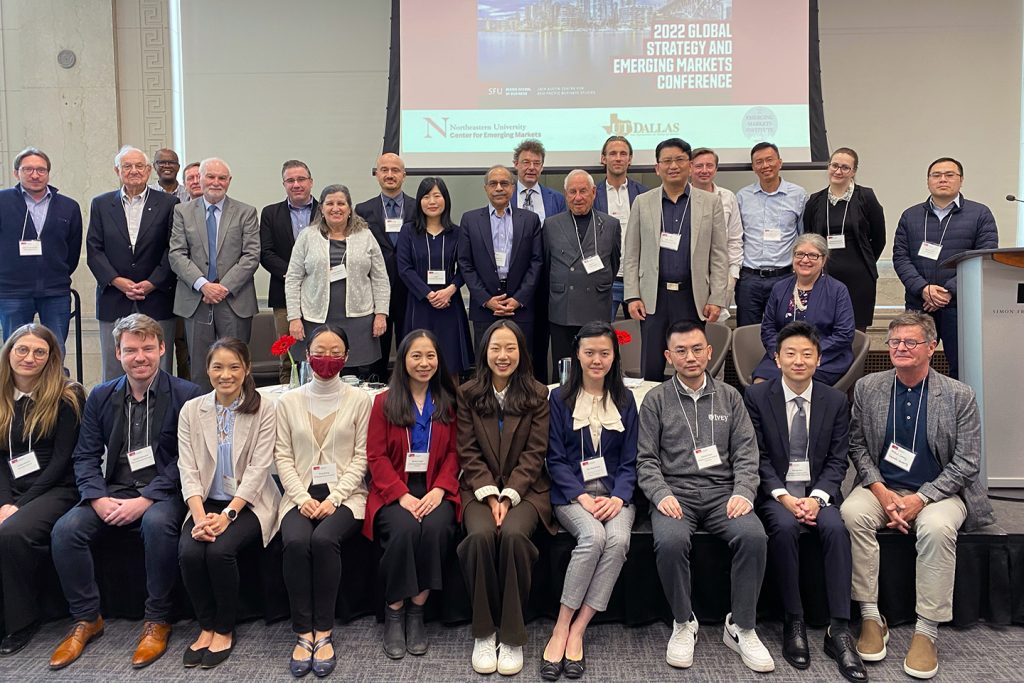Climate change, energy transition, and geopolitics in emerging markets: SFU Beedie hosts 2022 global conference
Jun 14, 2022

Attendees at the 2022 Global Strategy and Emerging Markets (GSEM) Conference.
Climate change, energy transition, and geopolitics were dominating themes at this year’s Global Strategy and Emerging Markets (GSEM) conference.
On May 7 and 8, SFU’s Beedie School of Business hosted the 2022 GSEM conference through the Jack Austin Centre for Asia Pacific Business Studies along with our partners Cornell University Emerging Markets Institute, Northeastern University Center for Emerging Markets, and University of Texas at Dallas Center for Global Business.
The conference brought together scholars, corporate executives, and policymakers to explore three interrelated topics—geopolitics, climate change and energy transition—and to understand how multinational enterprises navigate an increasingly uncertain environment.
This year’s conference, which took place in a hybrid format, provided a platform for engagement and interaction among scholars and practitioners in the fields of international business and strategy, cross-cultural management, technology strategy and global entrepreneurship—all of whom share an interest in global strategy and emerging markets.
“The conference themes centred around geopolitics, climate change, and energy transitions clearly resonated with both our academic and non-academic audiences,” says Daniel Shapiro, professor of global business at SFU Beedie and conference co-chair.
The conference began with a keynote speech by Yuen Pau Woo, Senator of Canada and former president and CEO of the Asia Pacific Foundation of Canada, who discussed geopolitics and, in particular, global relations with Asia. The conference also heard papers examining contemporary questions about the implications of geopolitics rooted in US-China rivalry for strategies of multinational corporations.
Among the many global issues raised at the conference, discussions around climate change and energy transition held particular importance. Featured keynote speaker, Randy MacEwen, CEO of Ballard Power Systems, led a discussion on the nature and importance of hydrogen fuel cell products and technologies in the energy transition.
A keynote panel including professors Ans Kolk of the University of Amsterdam and Jorge Rivera of George Washington University, as well as Dr. Jason Miklian, researcher at the University of Oslo, discussed academic research on climate change in a geopolitical context, including corporate responses and responsibility. A.J. Nichols from Vale S.A., a Brazilian multinational mining corporation, discussed the importance of geopolitics and critical minerals in the evolution of the mining industry as well as the corporate social responsibility issues confronting mining companies.
“The conference has received lots of positive feedback,” says Jing Li, professor of international business at SFU Beedie and conference co-chair. “Attendees especially appreciated the conversations between practitioners and scholars on the challenges, opportunities, and solutions for businesses in the dynamic global environment. We are also excited that the conference has attracted scholars at different career stages including PhD students to present their impressive research.”
Papers presented at the conference broadened the scope of the discussions to include diverse topics such as global investment strategies in a geopolitical context, corporate social responsibility in emerging markets, and emerging market multinationals.
To learn more about the GSEM conference or watch the video recordings, please visit the conference website.
